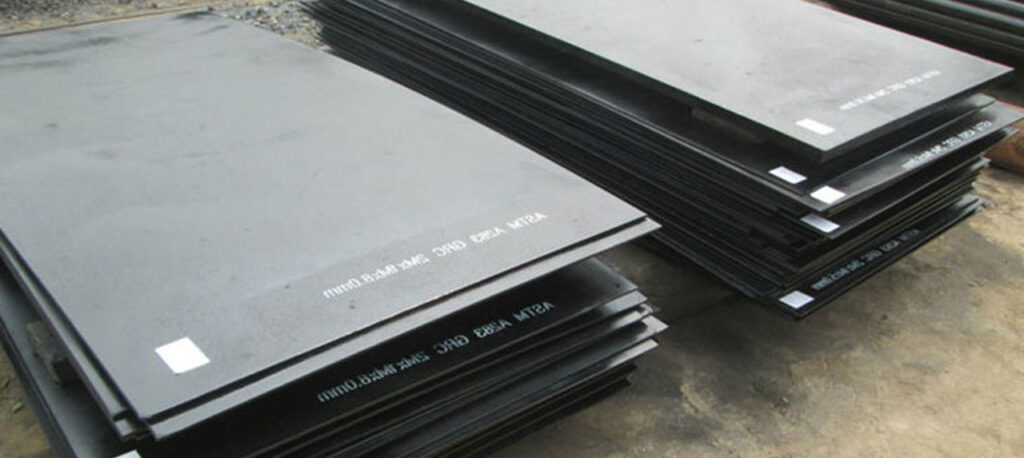If you work in the engineering, building, or construction industry, you may have come across the term Boiler Quality (BQ) plates. These steel plates are widely used in different applications, particularly in manufacturing pressure vessels, boilers and pressure pipes. BQ Plates consist of high-quality carbon steel, which makes them well-suited to endure high temperatures and pressures. In this blog post, we’ll present you with comprehensive information about BQ Plates.
What is Boiler Quality Plate?
BQ Plate, short for Boiler Quality Plate, is a specific type of steel plate widely employed in the production of boilers and pressure vessels. Its mechanical and chemical properties make it exceptionally well-suited for use in applications involving high temperatures and pressures. The plate is made of carbon steel and is graded based on its tensile strength, yield strength, and elongation characteristics.
Types of Boiler Quality Plate
Boiler Quality Plates come in various types, each designed to meet specific industry standards and serve different high-temperature and high-pressure applications. Here is a brief overview on different standards:
- ASTM A 515 Gr 60 & Gr 70: These ASTM standards pertain to carbon-silicon steel plates with improved tensile strength, essentially used for intermediate and higher temperature services such as boilers and pressure vessels.
- ASTM-A 537 Gr 60 & Gr 70: These ASTM specifications cover heat-treated carbon-manganese-silicon steel plates, ideal for pressure vessel applications in lower temperature environments.
- ASTM A516 GR 60 & GR 70: These ASTM standards involve carbon steel plates mainly intended for moderate and lower-temperature service in pressure vessels.
- IS 2041 R220, R260, H235, H265, H295, H355: These Indian Standards represent a range of steel plates used for pressure vessel fabrication, categorized based on their yield strength.
- IS 2002 Grade 1, Grade 2, Grade 3: These Indian Standards cover carbon-manganese steel plates for pressure vessels used at moderate and low temperatures.
- DIN 17155 Gr H1, Gr H2, Gr H3: These German DIN standards apply to heat-resistant plates used in pressure vessel construction.
- SA 516 Gr 60 & Gr 70: These are the ASME/ASTM standards for carbon steel plates used in pressure vessel fabrication, with different grades for varying temperature ranges.
Properties of Boiler Quality Plate
Boiler Quality Plates exhibit specific properties that make them well-suited for use in high-temperature and high-pressure applications. Here are the key properties of Boiler Quality Plate:
- Excellent Toughness: Boiler Quality Plates exhibit excellent toughness, which allows them to absorb energy and resist fracture under impact or sudden loads.
- Good Yield Strength: These plates possess good yield strength, enabling them to resist permanent deformation when subjected to stress or pressure.
- High Tensile Strength: Boiler Quality Plates have high tensile strength, which means they can withstand considerable mechanical stress without deformation or failure.
- Superior Hardness: They have a desirable level of hardness, ensuring they can withstand wear and abrasion, especially in harsh operating conditions.
- High-temperature Resistance: Boiler Quality Plates are designed to perform well at elevated temperatures without losing their mechanical integrity.
- Pressure Resistance: These plates are capable of withstanding high internal pressures without developing leaks or structural failures.
- Chemical Stability: Boiler Quality Plates are chemically stable, making them resistant to corrosion and other chemical reactions that may occur in aggressive environments.
- Machinability: They can be machined with relative ease, facilitating the manufacturing process.
- Weldability: Boiler Quality Plates offer good weldability, allowing for easy and reliable joining with other components in fabrication.
- Uniform Microstructure: They possess a uniform and refined microstructure, which enhances their overall strength and performance.
Boiler Quality Plate Advantages
Boiler Quality (BQ) plates provide numerous advantages, making them the preferred choice for various applications. Here are the key advantages:
- Lightweight and Strong: BQ plates are lightweight, yet they possess excellent strength and structural integrity, ensuring reliable performance in demanding environments.
- Durability for Repeated Reuse: These plates are highly durable, capable of withstanding frequent use and providing a long service life.
- Heat Conduction: BQ plates offer efficient heat conduction, making them suitable for applications where heat transfer is essential.
- Superior Thermal Insulation: They have excellent thermal insulation properties, maintaining stable temperatures and conserving energy.
- Easy to Clean and Maintain: BQ plates are easy to clean and maintain, reducing downtime and ensuring hygienic working conditions.
- Corrosion Resistance: These plates exhibit corrosion resistance, which helps them withstand the detrimental effects of moisture and chemical exposure.
- Recyclable and Environment-Friendly: BQ plates are recyclable, contributing to sustainability efforts and minimizing environmental impact.
Due to these compelling benefits, BQ plates are an excellent choice for various applications, including cuisine preparation, where their lightweight, strength, corrosion resistance, and heat conduction properties offer significant advantages.
Conclusion
The process of choosing the ideal Boiler Quality Plate for your project holds significant importance in ensuring optimal performance and meeting your specific needs. By taking into account factors such as the type, grade, size, load capacity requirements, environmental suitability, costs, and the reliability of the supplier, you can make a well-informed decision.
Considering these crucial aspects will empower you to secure the best-fitting Boiler Quality Plate that aligns perfectly with your project’s demands. With this comprehensive guide and Dmsons Metal at your disposal, you can proceed with confidence, knowing that you have selected the most suitable Boiler Quality Plate for your project’s success.

